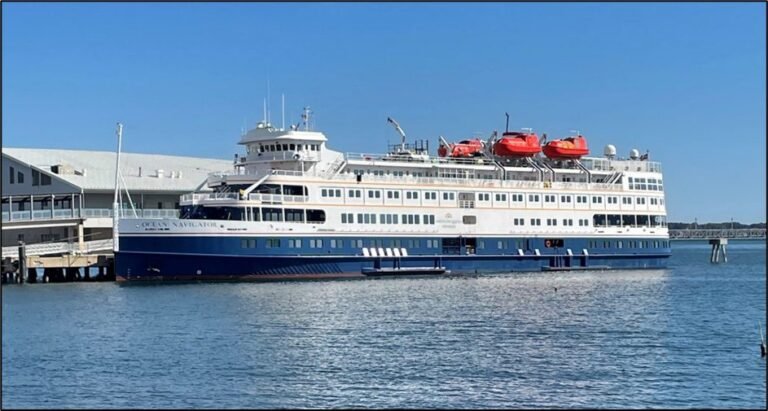The National Transportation Safety Board Investigates Engine Failure and Fire on Passenger Vessel
The National Transportation Safety Board (NTSB) has determined that debris in an engine’s lubrication oil system caused a serious engine failure and subsequent fire aboard the passenger vessel Ocean Navigator while docked in Portland, Maine.
The incident occurred on October 18, 2023, when the vessel’s no. 2 auxiliary diesel generator engine experienced a catastrophic mechanical failure. The event resulted in serious injuries to one crew member and an engine room fire. The vessel, which had 128 passengers aboard at the time, sustained an estimated $2.4 million in damage. Fortunately, no passengers were injured, and no pollution was reported.
Investigation findings revealed significant maintenance oversights. The vessel’s crew had operated the engine for more than 5,000 hours without changing the lube oil – five times longer than the manufacturer’s recommended interval. The last complete lube oil change was performed in September 2022, approximately 13 months before the failure. Additionally, the oil filter elements, which should have been replaced after 1,000 hours of operation, had been in use for over 3,000 hours since their last replacement in May 2023.
Post-incident inspection by third-party technicians uncovered extensive damage to critical engine components, including the crankshaft, main bearings, connecting rod bearings, and the no. 14 fuel injector. Further examination revealed abnormal wear on various bearings, showing signs of cavitation erosion and debris-related damage.
The NTSB concluded that the engine failure resulted from debris accumulation in the engine’s lube oil system, attributing this to the crew’s failure to follow manufacturer-recommended maintenance intervals. The contaminated oil system led to catastrophic mechanical damage and ultimately caused the fire when atomized lube oil ignited after being released through the engine’s ruptured crankcase.
Despite the serious nature of the incident, the crew’s quick response prevented the situation from escalating. By promptly securing engine room ventilation and fuel sources, they successfully contained the fire, which self-extinguished.
The NTSB emphasized the importance of following manufacturer maintenance schedules, stating, “Manufacturers provide maintenance recommendations and intervals to ensure equipment operates safely, optimally, and reliably throughout its service life”.
The report also highlighted the particular vulnerability of engine rooms to rapidly spreading fires due to multiple fuel sources and mechanical ventilation. It stressed the importance of crew familiarity with machinery, fuel oil, lube oil, and ventilation shutoff systems to effectively contain and suppress engine room fires.
The full details of this investigation can be found in Marine Investigation Report 25-13.
Subscribe for Daily Maritime Insights
Sign up for gCaptain’s newsletter and never miss an update
— trusted by our 109,202 members

